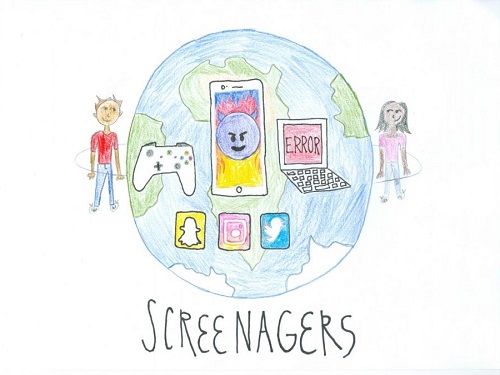Editorial: ‘screenagers’, becoming the new normal
“I fear the day that technology will surpass our human interaction. The world will have a generation of idiots.” – Albert Einstein
Teens today have grown up in the digital age, becoming familiarized with the constant exposure and use of electronics. Staring at screens of all kinds has become an integral part of today’s daily life. As this generation,“iGen” or “GenZ”, is the first of its kind, no one knows for sure what the long-term consequences that excessive screen time could pose, and the debate is real.
Smartphones and other popular devices, with screens that range in size, shape, and capability were created to entertain and simplify the lives of those who use them. However, these same devices have led to an array of complex problems unique to this generation.
According to an article in atlantic.com, rates of teen depression and suicide have skyrocketed since 2011. Thus, it’s not an exaggeration to describe “iGen” as being on the brink of the worst mental-health crisis in decades. Study after study shows that much of this deterioration can be traced to phones usage and screen time.
Many people, not just teenagers, use our devices regularly. But, it is the younger generation who feel the ever-present and intensified societal pressures more than ever. As a whole, our society needs to stop denying the possibility that the very devices we’re so attached to could cause our health to suffer.
A quote by research authors, Lin and Zhou, summarized that taken together, according to a psychologytoday.com article, [studies show] internet addiction is associated with structural and functional changes in brain regions involving emotional processing, executive attention, decision making, and cognitive control.
Furthermore, the idea that devices could hurt individuals emotionally, while they are alone, should make consumers wary of extensive use. However, the thought that this immoderate use could lead to alterations in our neurological structuring should disquiet individuals about their consumption of these devices.
Among the many concerns that have surfaced over the years, people are worried about how devices will affect individuals and their bodies/minds in the long run. In addition, adults who didn’t grow up with the technology available today are concerned about the lack of communication skills developed among youth. In fact, many argue that our devices are useful in making long-distance connections that were never possible before. While this may be true, our devices do get in the way of our relationships with the people in close vicinity to us.
According to deseretnews.com, researchers are finding that people communicate more often with family and friends because of technology, but the quality of that communication may be weaker. Kids who spend more time engaging through a screen than with other kids, or even adults, will struggle more to understand emotion and create strong relationships, or they will simply learn to become more dependent on others.
This study further proves the idea that these devices hurt not only our intrapersonal connections, but our interpersonal connections as well. Our screens are slowly stripping away basic social skills, which only leads people to wonder how, exactly, we should fix this problem and how vital these devices are actually to our day to day lives.
Technology is by no means going anywhere and it is an essential part of our daily life. However, it is equally, if not more, important to remember to use technology in moderation. Smartphones and other devices are amazing technological achievements, but that does not mean our world now has to revolve around them.
One must remember that it is essential to live in the moment and to disconnect every once in a while to avoid the all-encompassing effects of the virtual world and experience the joy of living real life.






